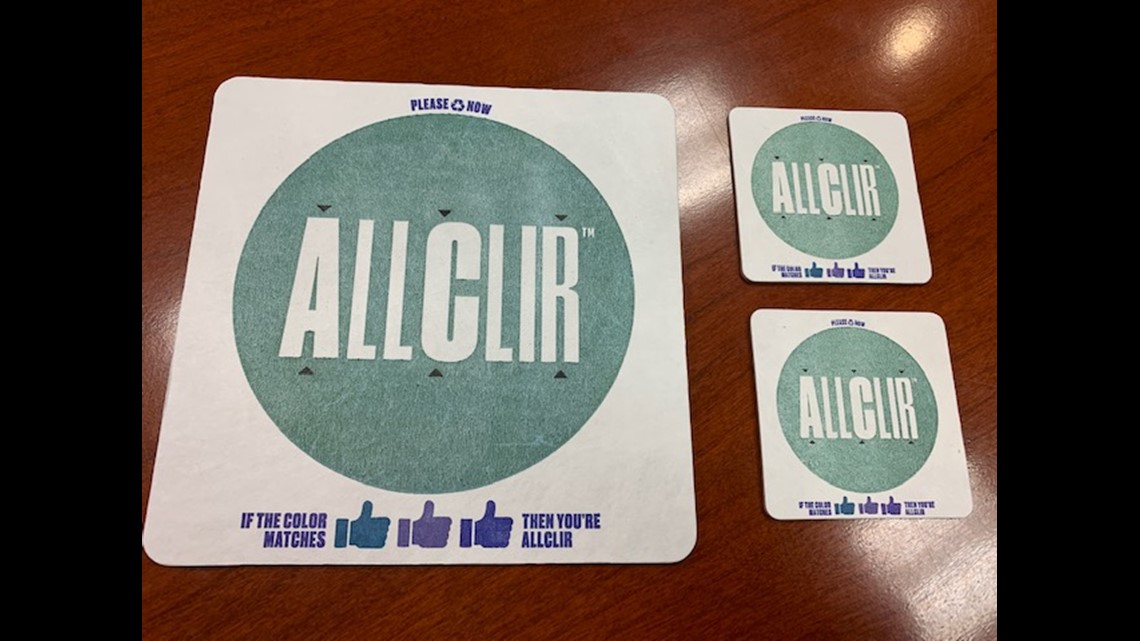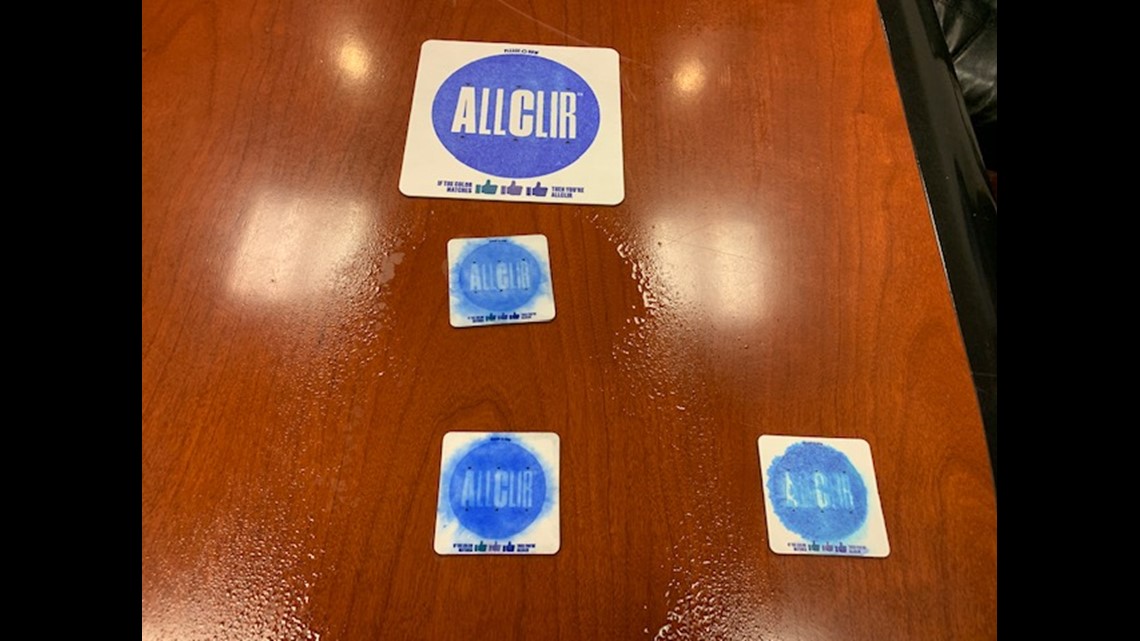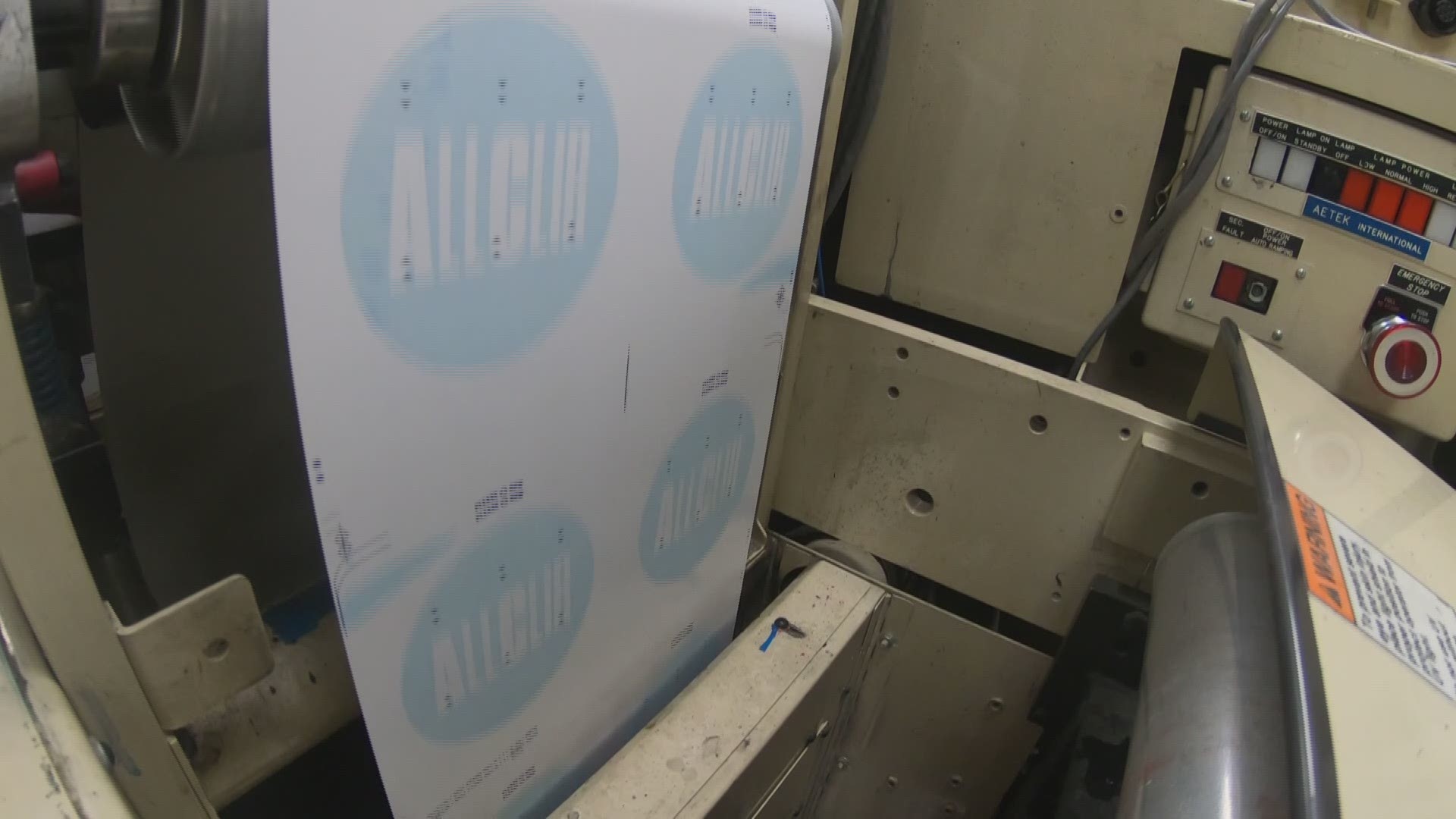PORTLAND, Oregon — When it comes to Covid, everyone wants to get back to some sort of normalcy. The vaccine will definitely help. But the sanitizing aspect of our lives is here to stay. As part of our series What's Next?, looking at the future of technology, work and innovation in a post-Covid world, there are a couple of guys here locally who got in the chemistry lab and might have just figured out a way to get us all back to traveling and working safely. And could make a fortune doing it.
In a SW Portland industrial park, the sound of a massive printing press running at full speed fills the room. It's rolling through contact sheets, printing a yellow-green substance onto adhesive and thin cardboard. 500,000 of these decals can print in an hour. Spike Bailey, a retired entrepreneur is now back in the game, and moving quickly down the halls and in and out of offices. He's onto something.


"When I started asking people what would make you come back, they said I would have to have proof that the space I'm in is safe," Bailey told KGW. When Covid started shutting things down, he got an idea. He teamed up with a chemist and gave a challenge: come up with pH-activating substance that would visually "flash" when it was touched by the right amount of disinfectant to kill the virus.
The CDC calls it the N list. They are chemicals like Clorox, Lysol and commercial grade cleaners authorized and proved to kill Covid-19. There are 535 of them. Each have what's called a "wet time", or the number of minutes a surface has to stay wet with that chemical and most importantly, air dry, for the virus to be eliminated. Lysol Disinfectant Spray has a wet time for example of two minutes.
Bailey's idea didn't have to wait those literal minutes. It just had to measure that right amount of disinfectant sprayed. After months of failures, his chemist figured it out, and they named it AllClir. "It had to be visual, it had to be quick and it had to be permanent. If it had those three elements, people would gather, they would have confidence in it," Bailey said.
Above Spike Bailey, founder of AllClir, gives a demonstration of how his sensors detect enough Lysol is sprayed on the surface to kill Covid-19.
Bailey gave KGW several demonstrations of how it works. He set three AllClir sensors on a conference table, on a leather chair nearby and on the floor. Using the Lysol Disinfectant Spray high overhead in a sweeping motion, he sprayed over the table. Within seconds, you see the AllClir circular logo, activate from the yellow-green color permanently to deep blue. It means, enough Lysol was sprayed to stay wet the two minutes required to air dry and kill Covid. AllClir can detect 75-80% of the 535 N list chemicals.
Bailey's formula can be printed large on cardboard, like coasters, small and there are stickers for vertical surfaces. The places and industries to use them are endless: hotels, rental cars, airplanes, vacation rentals, even places like movie studio film sets or the New York Stock Exchange floor.
Companies can put a few sensors out before a cleaning and for the first time ever, see the proof after, that it was done right. They're tamper proof too. If a sensor was just sprayed directly with a hit of disinfectant the logo is designed to heavily "bleed" over the lines as the tell tale sign.


Once the logo turns that dark blue, it stays that way permanently. So for example, if a hotel room was sprayed down and the sensors are activated that it's clean, even if no one goes in there for 3 months, it'll still show them it's clean.
AllClir has been tested in the field over and over with many different cleaning crews using disinfectant fogger machines. "You have to remember these crews have had no visual evidence that they were not spraying enough. Nothing. So when we put them (sensors) out and they sprayed. And they sprayed again. And they sprayed again, now they have an idea of what 'wet' really is. So now they go 'Well that was easy', so we put out new units and said 'Spray until they're blue', and now they understand what wet really is, and why they shouldn't wipe it up. If you don't maintain the wet time, you might as well have not done anything," said Bailey.
The AllClir team owns the intellectual property rights to the flashing formula and how it's printed. In Oregon a hotel, a church group and a large busing company are all testing it before it goes worldwide. For Spike Bailey, coming out of retirement to put this idea in motion is a hope for a lasting legacy. If I can somehow be part of getting people back, that's something I can leave my 16 grandkids and say 'Grandpa did that, it's part of how we came back'."
Here's an example of how AllClir says it can help recoup some money for certain businesses. Right now, OSHA guidelines for employee safety require hotels to wait a day for cleaning staff to even enter a room after a guest leaves. Bailey says now staff could use their disinfectant fogging machines to "spray their way in" the same day, wait the 2-5 minutes of wet time by spraying another room, go back and clean the room, change the sheets etc., put down the AllClir sensors and then spray their way out once they're activated. The room is now rentable hours later instead of days.
The AllClir system is for sale now if businesses are interested. A 50 pack of the large cardboard coasters is $200, a roll of 100 stickers is $175.

